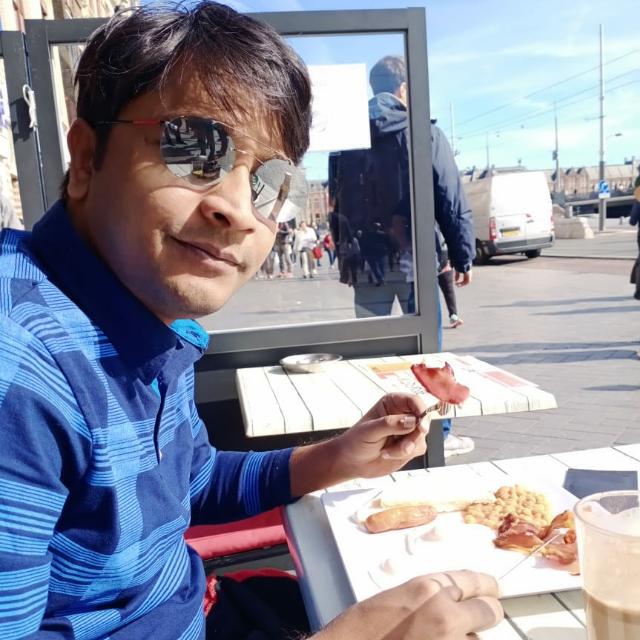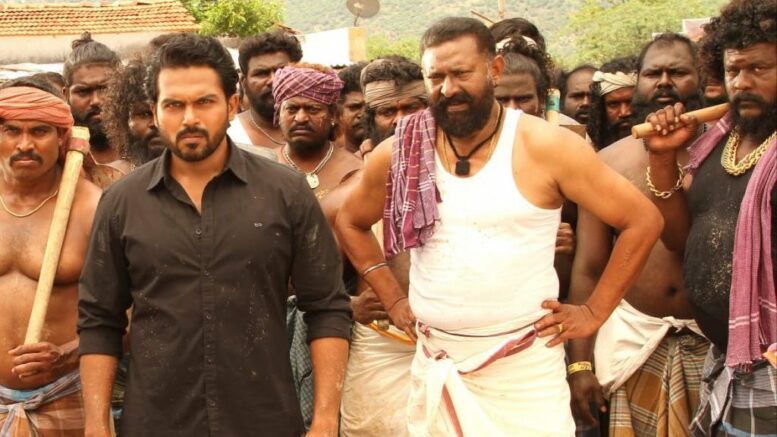After the prologue and start credits, Sultan begins with a Godfather like scene where the leader of a gang, Napolean is approached for help by a group of villagers. The ask: to kill a person much like Bonasera. But since the setting is among a fighter clan, there is no rational explanation by this movies Godfather (Napolean) to overrule the killing. So, the unfortunate villain is marked for death at this very moment.
Into this scenario enters the prodigal son Sultan/Vikram (Karthi), part Krishna from Mahabharat, part Michael Corleone from Godfather. And thus, the film begins to explore, in its own words: “what if Krishna sided with the Kauravas?”. And the clan of warriors behind Karthi do resemble the Kauravas in might and in numbers (there are close to 100 of them). This group further goes into a sort of Agyantavasa (exile) to kill a strongman tormenting the villagers while the hero has another motive (obviously noble as this a star hero we are talking about here).
The villagers’ problems feel inconsequential, as the screenplay could easily replace them with minor issues.
As long as the movie stays in the Godfather-Mahabharata space, it is interesting. Which is till the halfway mark as Sultan turns from a passive reformer to a fighting saviour.
The interval arrives with the crowd cheering the hero as Karthi stands stunned at the centre of it looking at the blood on his hands. Post interval the movie turns into a generic masala film. By itself it is not an entirely bad thing but considering the promise shown in the first half, the overall movie is a tad disappointing. Speaking of disappointment, watching Yogi Babu go back to an unfunnier version of his staple roles was sad especially coming on the back of Mandela.

Rashmika Mandanna steps into a Hansika-esque role, but the character lacks depth in a rural setting.
Rashmika Mandanna, who has now replaced Hansika Motwani across Southern industries plays a typical Hansikaesque character that looks out of place in a rural set up. It does not help that her character does not get enough meat. The rest of the class is only in attendance filling the frame with nothing substantial to contribute (except for Lal who plays a mix of Sonny Corleone and Duryodhana). The 2 villains are cardboard cut-outs who do nothing more than appear pissed, kill people, speak through a dubbing artiste, and get thrashed.
Ramachandra Raju reprises his KGF role on a smaller scale.
Ramachandra Raju, who gained popularity as Garuda in KGF, ends up playing the same role albeit on a smaller scale. Like in KGF, a group of commoners are under his thumb and praying (even plotting) for him to die, waiting for an outsider to break them free. If I did not mention what exactly are the problems of the villagers and the second villain in the film, it is because these are barely consequential to the story. The villagers could have had a problem with swarming of mosquitos or the youth deserting the village for city life and the screenplay would have stilled reached the destined end with minor word replacements.
Karthi looks and plays the part of a Robotics Engineer from Mumbai who comes back home to find his father, the patriarch of a clan of rowdies, dead. Before his death the responsibility of the clan is passed on to him and thus begins his struggle to switch them over to the side of non-violence. The path to this imminent peace however goes over a river of bloodshed, sermons on non-violence and detours of a love story. All of this muddles the core of the film which had the capability of being turned into something much more than just another tale of a hero’s glory. While also leaving us with the question – could the sins of these folks be easily washed away by the sweat from a honest day’s work in the fields?

Captive of the 24 frames and admirer of the written word. If it is not on the silver screen or on the pages of a paperback, it might as well not exist.


Be the first to comment on "Sultan (Review) Tamil Review"